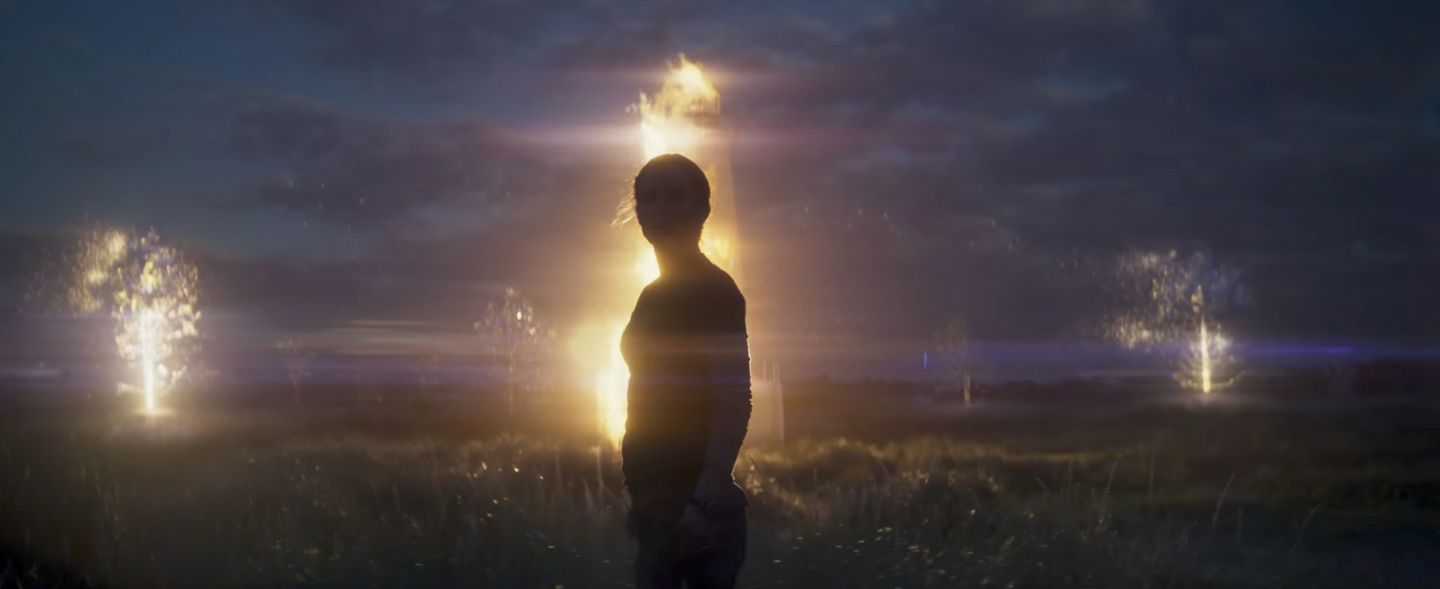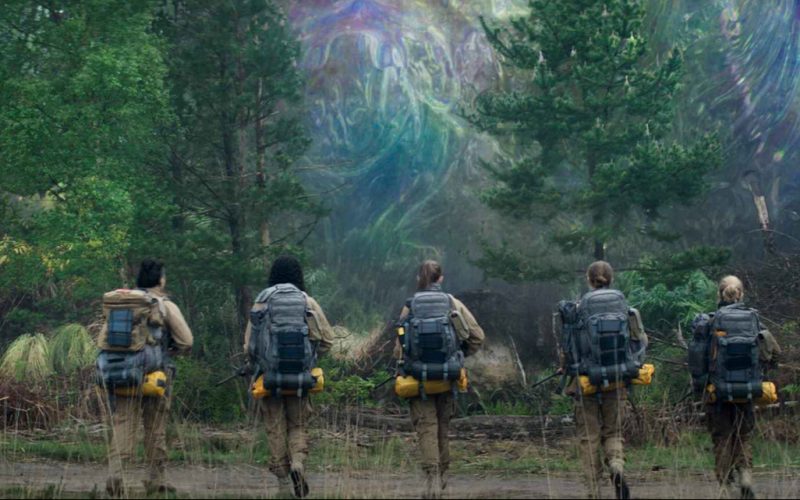Annihilation (2018) – Review.
The protagonist in Alex Garland’s second feature film, Lena, has a military background but also an academic one. She specializes in biology and has found success as a professor in her field. She’s also in mourning for her husband, who left for duty and twelve months later is still MIA. Lena is the first to be introduced in a small ensemble of women who take it upon themselves to enter the Shimmer, a mysterious quarantined zone from which no communication can be received or sent, and from where only one soldier has returned.
That soldier happens to be Lena’s husband, who returns out of the blue in the opening part of Annihilation. Something is very off with Kane (Oscar Isaac), which is the instigating factor that convinces Lena to go into the Shimmer and find some answers. The film takes just enough time to round out its remaining cast prior to the mission. Jennifer Jason Leigh plays Doctor Ventress, a psychologist who hopes to reach the lighthouse that she believes to be the heart of the Shimmer; Tessa Thompson as physicist Josie Radek; Gina Rodriguez as the paramedic, Anya Thorensen; Tuva Novtony as surveyor and geologist Cass Sheppard. Once inside the Shimmer, the characters encounter a lush environment that would surely shine on the big screen.
 The landscape is as beautiful as it is dangerous. The editing is subtle but stellar, and so much of the imagery belongs framed and hanging from a wall. Many images stand out; a beach of crystal trees, a field of plants grown naturally into the shape of humans, and the place beneath the lighthouse all spring to mind. The blur around the edges of the screen only adds to the film’s constant sense of unrest. Everything inside the Shimmer is distorted too, and it begins warping the characters both physically and mentally. The entire film is an inventive exercise in horror science fiction, paired with some gorgeous production design.
The landscape is as beautiful as it is dangerous. The editing is subtle but stellar, and so much of the imagery belongs framed and hanging from a wall. Many images stand out; a beach of crystal trees, a field of plants grown naturally into the shape of humans, and the place beneath the lighthouse all spring to mind. The blur around the edges of the screen only adds to the film’s constant sense of unrest. Everything inside the Shimmer is distorted too, and it begins warping the characters both physically and mentally. The entire film is an inventive exercise in horror science fiction, paired with some gorgeous production design.
Garland never carries his audience through the intellectual maze he’s created. Based on the novel by Jeff VanderMeer, Annihilation is a piece of art worth discussing with others. There’s so much substance to explore pertaining to the mysterious nature of the Shimmer, and its effects on the living organisms within. It all encourages conversation (and, most likely, disagreement). The script never wastes any time. Its structure alleviates a little of the tension, though it never reveals an excessive amount of information before its due, and some later parts cast the present in a different light. The film remains fundamentally about how Lena makes it out of the Shimmer, not whether she does or does not. In that sense, it’s absolutely about the journey and not the destination.
 It’s also never gory or upsetting in the same way as, say, Alien or The Thing, but it’s certainly frightening at times. Garland never shows more than he needs to, and individual scenes are perfectly paced to draw maximum suspense. As a whole, it’s a fresh spin on the well-drawn-out fad of the dystopian epic, while having more in common with films such as 2017’s Alien: Covenant in terms of visual style. Still, it would be doing Garland’s film a disservice to begin comparing it to other films when it is so distinctly unique and, unfathomably, original.
It’s also never gory or upsetting in the same way as, say, Alien or The Thing, but it’s certainly frightening at times. Garland never shows more than he needs to, and individual scenes are perfectly paced to draw maximum suspense. As a whole, it’s a fresh spin on the well-drawn-out fad of the dystopian epic, while having more in common with films such as 2017’s Alien: Covenant in terms of visual style. Still, it would be doing Garland’s film a disservice to begin comparing it to other films when it is so distinctly unique and, unfathomably, original.
Natalie Portman shines in her best role since 2010’s Black Swan, as Lena, a woman who is as fierce as she is desperate. She’s strong like few female leads truly are, and her flaws are borne directly from her inability to cope socially with the loss of her husband and her need to find answers when none are offered. Thompson plays a rather subdued role, though Josie does manage to find her own strength in a rather understated arc. If there are comparisons to be made to other ensemble horror films, it stops at Annihilation’s cast of characters. Gone are the tropes and the inconceivable actions of intellectuals and professionals, replaced with characters that act in accordance with their motives, their predicament, and their level of expertise. They behave exactly as they would be expected both as academics – and in Lena’s case, as soldiers – and additionally as terrified victims. The elephant in the room is this; at a time when there is a greater need and desire for films steered by firm, female-led characters, Paramount had a gem on its hand that it decided to bury. Annihilation will, hopefully, be remembered as one of the recent greats of sci-fi cinema, but Paramount’s treatment of the film will surely go some ways to limiting the film’s success.
 The film’s final act is an unsettling dance, a violent and fascinating climax that might lose viewers unprepared for the experience. It’s a deeply thought-provoking story with a constantly present sense of dread. The uncertainty is a precedent set from the very beginning; Kane’s return early in the film is appropriately surreal. Cinematographer Rob Hardy captures the forest in striking and vivid detail which ensures that, should the plot lose its viewer for any time at all, the visuals will keep us invested on some level. The special effects are stunning and absolutely essential to the more spectacular aspects, and the entire final act is something of a fever dream.
The film’s final act is an unsettling dance, a violent and fascinating climax that might lose viewers unprepared for the experience. It’s a deeply thought-provoking story with a constantly present sense of dread. The uncertainty is a precedent set from the very beginning; Kane’s return early in the film is appropriately surreal. Cinematographer Rob Hardy captures the forest in striking and vivid detail which ensures that, should the plot lose its viewer for any time at all, the visuals will keep us invested on some level. The special effects are stunning and absolutely essential to the more spectacular aspects, and the entire final act is something of a fever dream.
Hours could be spent percolating over the final conflict alone, preceded and succeeded by some of the most puzzling and challenging science-fiction filmmaking of recent years. Annihilation could have been this year’s big science-fiction event movie, and may still be despite it’s small screen international release. It comes in the wake of recent films like Arrival and is destined to remain relevant both as an example of high-quality genre entertainment and a piece of art that you may well find yourself ruminating over long after it’s ended.
Film ’89 Verdict – 9/10
Annihilation is available on Netflix now (regional variances may apply).

